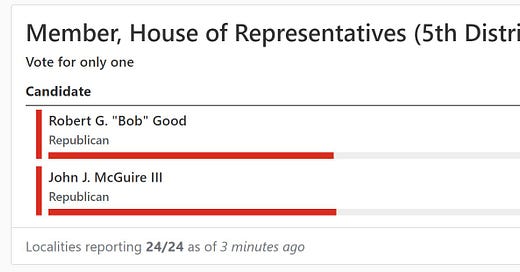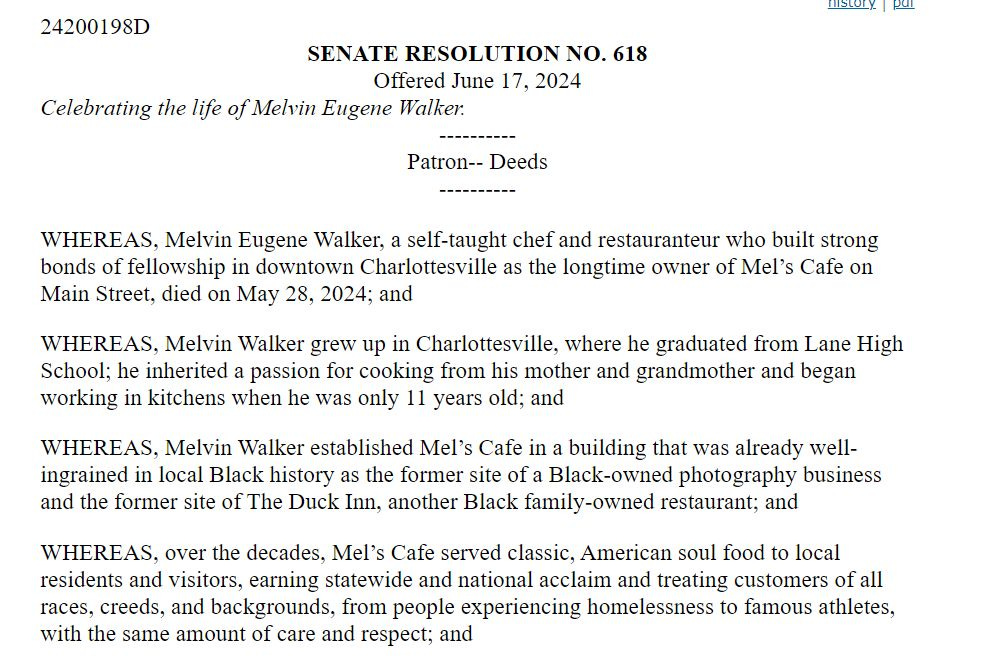June 19, 2024: Fifth District Republican nomination race too close to call; Witt gets 57 percent of vote in Democratic primary
Plus: Senate Finance and Appropriations Chair Lucas takes different path to resolve military survivor benefit program issue
Today is Juneteenth, as we learned about in yesterday’s edition of Charlottesville Community Engagement. Many have the day off to celebrate, commemorate, or otherwise reflect on the nation’s history. This is also a day in which construction on the new Charlottesville Middle School continues, and a day in which there is information to get out there. I’m Sean Tubbs, and it’s time to get to the research.
In today’s installment:
Republican John McGuire claims victory in the Fifth District primary for his party, but Bob Good is not conceding defeat in the close race
Democrat Gloria Tinsley Witt secures the Democratic nomination with over 57 percent of the vote
State Senator Louise Lucas chose a different path to fix a military survivor benefits program, a path Governor Glenn Youngkin did not appreciate
The Virginia Senate honors the life of the late Mel Walker of Mel’s Diner
The UVA Buildings and Grounds Committee gets a look at how capital projects come together on an always expanding Grounds
First-shout: Five Things ReLeaf Cville Has Done This Year
In today’s first subscriber-supported shout-out: ReLeaf Cville seeks to help restore the amount of the city that’s covered by trees. This year they’ve done five things they want people to know about:
The Virginia Department of Forestry awarded a $190K grant to preserve mature trees in neighborhoods with low tree cover, targeting Fifeville
Another grant helped with the planting of almost 130 trees in the Rose Hill neighborhood
This summer will be the third in a row they’ll partner with the Rivanna Conservation Alliance to train young people to help with outreach efforts to plant trees in the Woolen Mills neighborhood
They partnered with the Van Yahres Tree Company to provide volunteer work on Arbor Day to check in with recently planted trees in the 10th and Page neighborhood
They’ll be appearing on VPM on June 25 to discuss their work to date
If you’d like to support their work, visit releafcville.org
Primary results: McGuire has 315-point lead over Good; Witt wins handily over two fellow Democrats
After several intense months of fierce campaigning between two Republicans, the narrative for the Fifth District Congressional race changes slightly now that both primaries have been held.
On the Democratic side, Gloria Tinsley Witt received 57.17 percent of the 24,343 votes casts, with Paul Riley and Gary Terry each just over 20 percent.
On the Republican side, State Senator John McGuire has 31,370 votes to 31,055 for two-term incumbent Bob Good. That’s a half percentage point of difference and Good did not concede in a post on Elon Musk’s social media website.
“The entire DC Swamp was aligned against us with over $10 million in attack ads, but with your help we were able to make this race too close to call,” Good’s campaign wrote. “We are doing what we can to ensure we have teams of observers and legal counsel to ensure all the votes are properly counted in the coming days.”
McGuire accepted his 315-vote difference as victory enough and also posted to Elon Musk’s social media site.
“There are still a few votes left to count, but it’s clear that all paths end with a victory,” his campaign wrote in one post.
McGuire declared his candidacy in the Republican primary for the Fifth District just eight days after being elected to the state Senate last November. He secured the endorsement from convicted felon and former President Donald Trump after Good initially endorsed Florida Governor Ron Desantis. Good doubled down on his support for Trump, but the McGuire campaign continued to call his loyalty to the Republican leader into question.
There is no acknowledgement of Witt’s victory on her website and the candidate does not appear to have a social media presence.
The Federal Election Commission has campaign finance data through May 29, and both the Good campaign and McGuire campaign raised over a million not including advertising paid for by outside groups. Witt on the other hand had only raised $20,198. Terry raised $13,465 and Riley raised no funds.
Meanwhile in the 7th District, Republican Derrick Anderson got 44.35 percent of the vote in a crowded field. On the Democratic side, Eugene Vindaman secured the nomination with 49.42 percent of the vote.
No vote any time soon on legislative fix to military survivor benefit program
Yesterday, the Virginia General Assembly was to have begun work in a continuation of a special session to take up legislation to fix a bill that passed earlier in the year. The bill put restrictions on the use of a program that helps survivors of slain military personnel pay for education.
However, Senator Louise Lucas opted instead to take a different path yesterday as she explained as chair of the Senate Finance and Appropriations Committee.
“Today we came back to find a long-term viable solution for the Virginia Military Survivors and Dependents Education Program,” Lucas said. “This program is important for those families and students that it serves but I also want to ensure that the program is financially sustainable.”
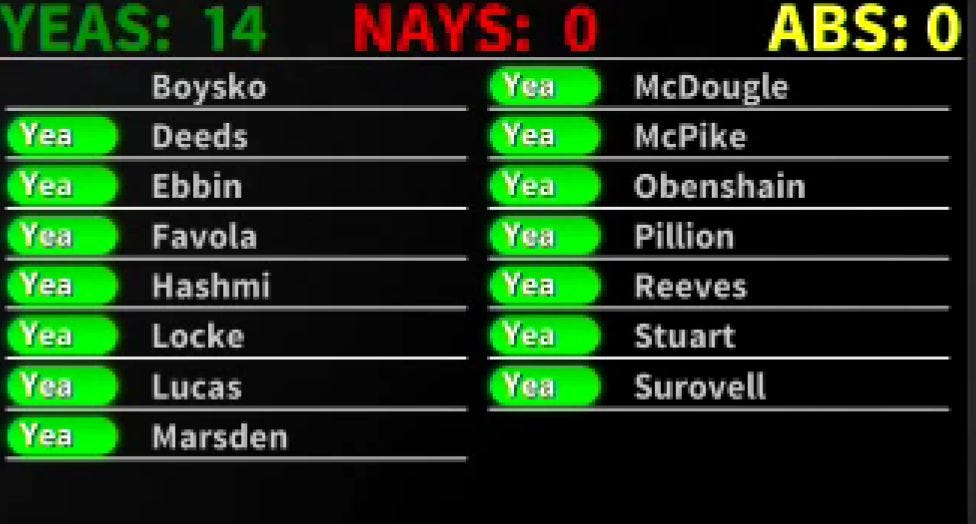
Both Senator Bryce Reeves (R-28) and Delegate Luke Torrian (D-24) had filed legislation that would have stripped new restrictions and qualifications added that drew an outcry from many. (HB6003) (SB6003)
Lucas said issues should be studied further to avoid unintended consequences to the program. She announced both the creation of a special select work group and a request for the Joint Legislative Audit and Review Commission to do an expedited review. The work group will consist of Barbara Favola (D-40), Jeremy McPike (D-29), Danica Roem (D-30), Reeves, and Bill DeSteph (R-20).
“I expect to work in a collaborative fashion with all Senators to come up with a more eloquent solution in the coming weeks,” Lucas said.
In addition, Lucas said other bills introduced for this special session would not be docketed such as SB6004 which would have come up with a framework for how skills-games might be allowed to become legal again.
Governor Glenn Youngkin issued a statement several hours later.
“I stand with our military heroes, first responders, and their families today who are stunned that Senate Democrat leadership failed to even consider a simple bill, supported by a bipartisan majority of Senators, to reverse the changes to VMSDEP by fully repealing the language, and addressing this in the full light of day,” Youngkin wrote.
The committee did use their time to go through SB6005, an appropriations bill. Perhaps more on that in another edition of this newsletter.
The full Senate did approve several resolutions commemorating people, including the late Mel Walker introduced by Senator Creigh Deeds (D-11). (read the resolution)
“Melvin Walker served every delicious meal with a positive attitude and a heartfelt smile, and he cultivated deep ties with the University of Virginia and other local institutions to enhance community life on Main Street and throughout the city,” reads one paragraph.
“Melvin Walker was a beacon of hope in the community, hiring many individuals who faced challenges finding employment elsewhere and offering his wealth of experience and expertise to young entrepreneurs to ensure their success,” reads another.
“The Senate of Virginia hereby note with great sadness the loss of Melvin Eugene Walker, owner of Mel’s Cafe and a pillar of the Charlottesville community,” reads one closer to the end.
There do not appear to be any other meetings of the full General Assembly listed on the calendar.
Sponsored message: Buy Local
Buying locally supports our neighbors and community members and makes a big impact for our local economy. Local businesses are more likely to reinvest in our community and their goods and services contribute to the unique character of our community.
Learn more about how you can support local business at ShowLocalLove.org and on social media:
UVA panel learns how planning and budgeting works for capital projects
Shortly after approving the University of Virginia’s major capital plan for the next five years on June 7, the Buildings and Grounds Committee of the Board of Visitors turned their attention to getting a briefing on how the spending document is put together.
Anything that gets built is a joint collaboration of the University of Virginia architect and Facilities Management department.
“They’re the ones who develop capital projects at the University from the very first concept all the way to the ribbon-cutting like we did yesterday,” said Colette Sheehy, the Senior Vice President for Operations and State Government Relations at UVA.
Many projects begin with a feasibility study to determine whether something is needed such as whether there’s a need for a new engineering building. At any given point, there are many previous studies to implement, such as the 2019 Parking and Transportation Study. That document has informed the placement of the various parking garages that have taken place over the years.
Ideas themselves come from school deans, top officials, public safety, or other aspects of UVA.
“The concepts are outlined and brought forward to the executive vice presidents, they will do an evaluation saying ‘should we do this, should we do it now, should we defer it,’” Sheehy said. “All of that keeps bumping up to when the executive vice presidents and the president meet to determine what the program that you saw today should look like.”
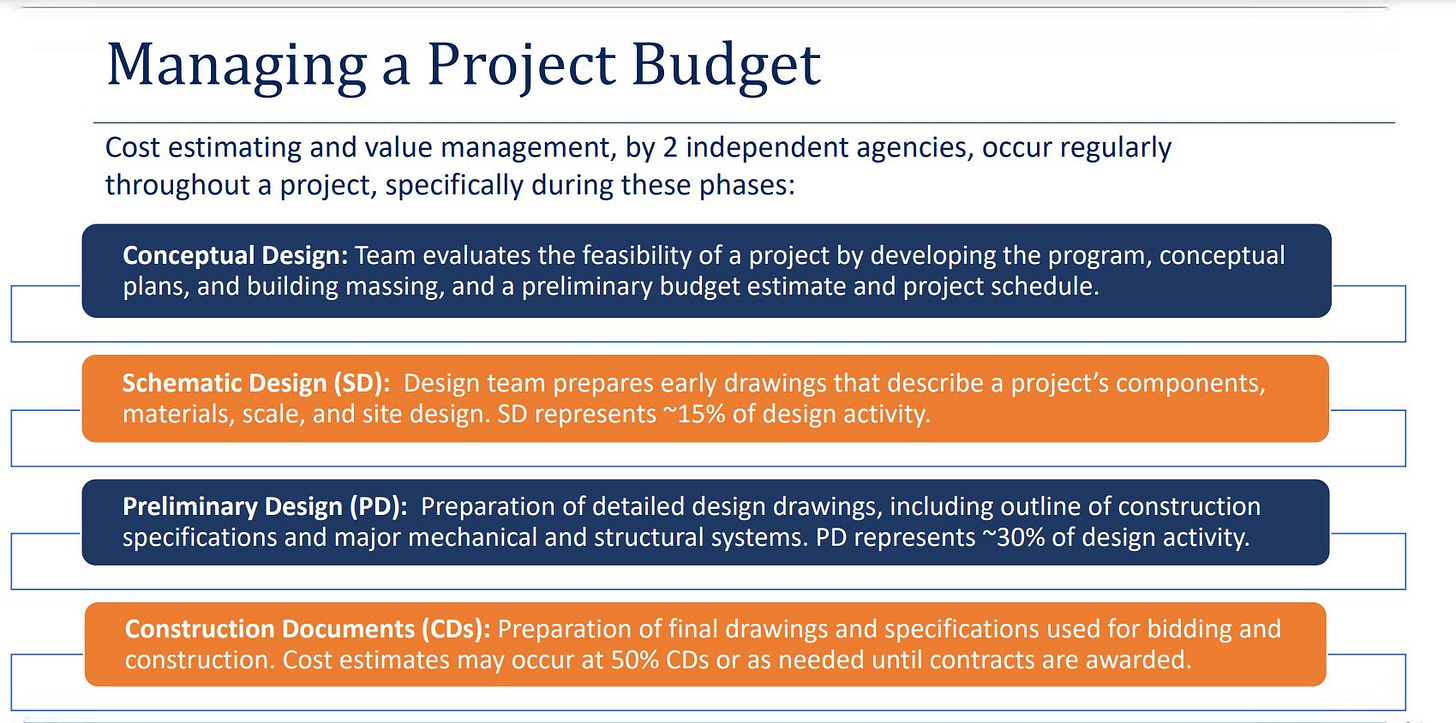
J.J. Wagner, the executive vice president and chief operating officer at UVA, said items can be added to or subtracted from list as new conditions are knowing, including proposals that come from major donations.
“It’s very fluid,” Wagner said. “There’s a year-long process and every year it can adjust which is why we come back each year.”
Budgets adjust each year as prices for the various components continue to fluctuate.
Pre-design work and other conceptual work can take place in house to shape the idea.
“Then we will go into selecting an architect or an engineer depending on the project and in the course of developing the design, we’ll figure out what construction method we want to use,” Sheehy said.
This refers to procurement. In one option, UVA and its hired architect could design the building and put out the drawings to bid with the lowest bidder winning. In another, UVA partners with a contractor at the outset to design and build something.
“We’ve used that for instance on parking garages, we’ve used it in student housing,” Sheehy said.
In the third method, the contractor hired assumes some of the risk of the project and is responsible for setting the budget for subcontractors. This requires the project to be submitted to the engineering division of the Virginia Department of General Services.
“Up until July 1 of this year, like, in three weeks, that opinion was advisory and we could choose to not follow it if we felt strongly that the CM at risk was the way for us to manage the project but the General Assembly in 2024 session passed a new law,” Sheehy said.
That new law requires any project over $65 million for approval. The Board of Visitors would still have the ability to overrule the General Services department.
Donald Sundgren, Associate Vice President and Chief Facilities Officer at UVA, said the new Center for the Arts is already approved to go through this process if the Board decides the project will move forward.
“One thing that the state doesn’t recognize is schedule,” Sundgren said. “We’ve taken a lot of advantage of improving our schedule by doing CM at risk.”
For example, the new football operations center and the Olympic sports complex were done using this method though the state did not approve.
“And we gained nine to 12 months on the schedule on those projects by getting early packages and getting into the field sooner,” Sundgren said.
There were several questions about budgeting and who comes up with the numbers. That depends on the project, though Sheehy said that by this point, UVA understands the local environment for construction.
“What’s interesting about Charlottesville is that we are relatively small market for construction,” Sheehy said. “We have limited numbers of subcontractors. We can attract the big national firms in to be construction managers but they all have to use the subcontractors that are locally in the market.”
Sundgren added that the market extends from Harrisonburg to Richmond. Either way, Sheehy said this means that sometimes UVA is competing with itself for builders and so can’t put too much out for bid at once.
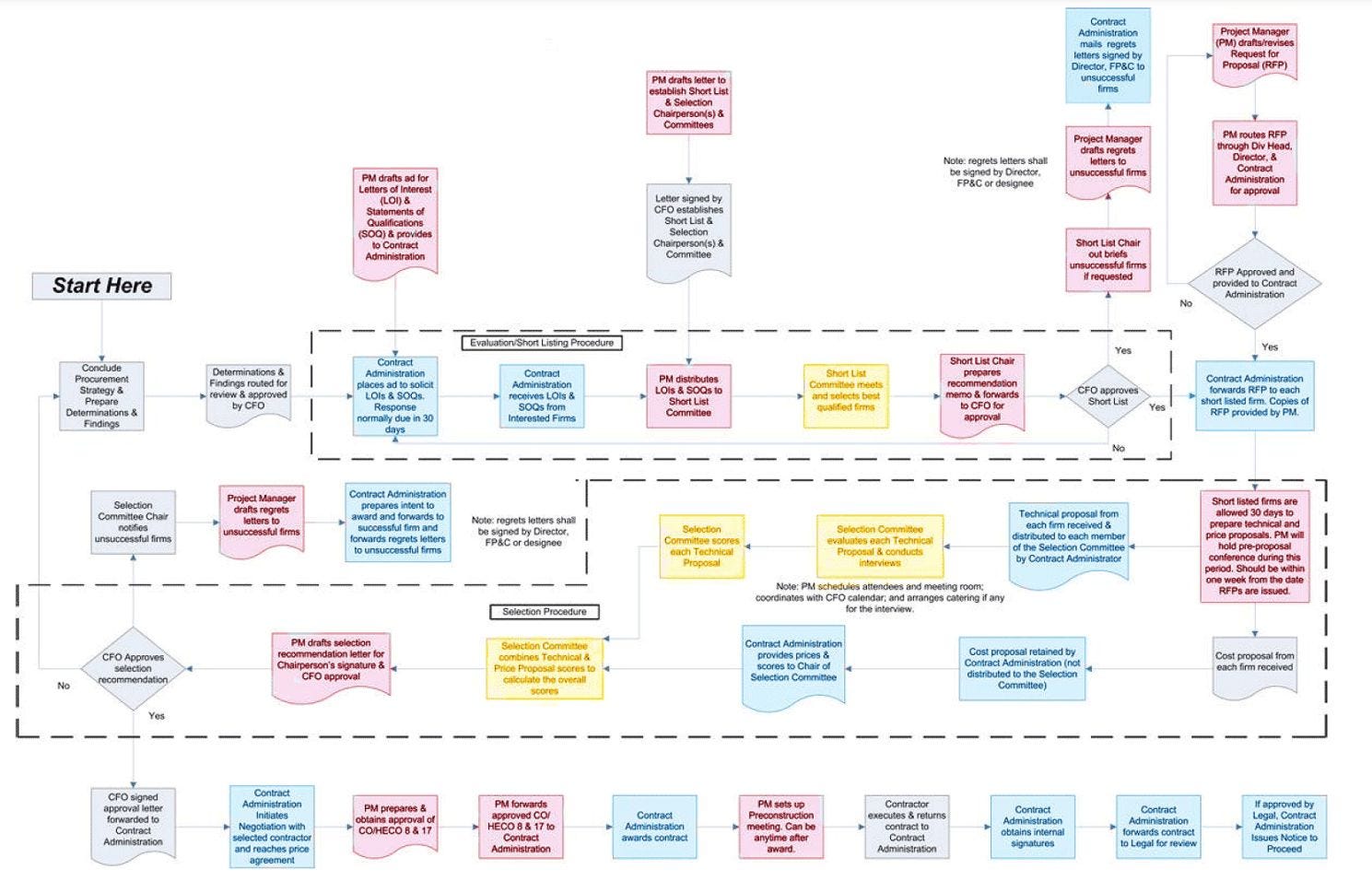
Reading material
Public transit in the post-pandemic world: Views diverge at congressional hearing, Dan Zukowski, Smart Cities Dive, June 17, 2024
Energy demands for Northern Virginia data centers almost too big to compute, Whitney Pipkin, Chesapeake Bay Journal, June 18, 2024
Metro Adding Hydrogen Buses, Auditor Casts Doubt on Fleet Electrification Strategy, The Urbanist, Stephen Fesler, June 18, 2024
Witt wins Democratic nomination in 3-way contest in the 5th District, Markus Schmidt, Cardinal News, June 18, 2024
An unexpected #692
I had not anticipated a full newsletter today, but two big things happened yesterday in Virginia politics and many of you might not know about them. People pay me to pay attention, and when there’s something to write, I’ll write it. I believe in the brand of journalism that I practice, and I believe that the hundreds of people paying trust me to be there when there’s something they might want to know.
Today was supposed to just be a podcast day, but I wanted to know what happened. And for me, that means doing the research. When I do the research, I usually find something interesting and people pay me to write.
There are almost 3,000 subscribers now, and just over a fifth pay. This is a ratio that’s held up since the beginning of the newsletter. I continue to win over long-time free subscribers to a paid one. I’ll keep doing that, because this work is what I do for a living, and I live to do this work. Thank you for allowing me this ability.
Ting will match your initial subscription, whether it be at $5 a month, $50 a year, or $200 a year. It is quite generous of them to do so, and I appreciate their investment in this style of community journalism.
Ting can help you with your high speed Internet needs. If service is available in your area and you sign up for service, enter the promo code COMMUNITY and you will get:
Free installation
A second month for free
A $75 gift card to the Downtown Mall

